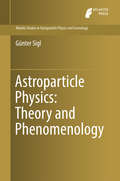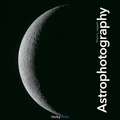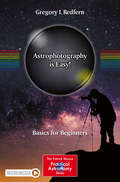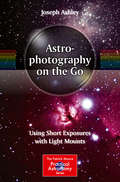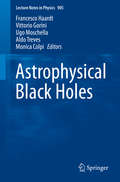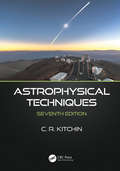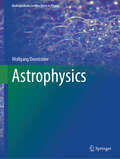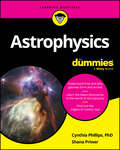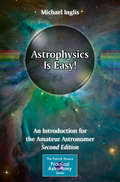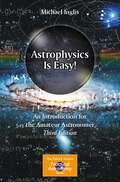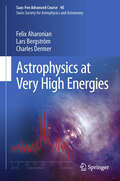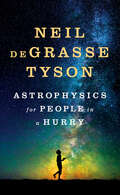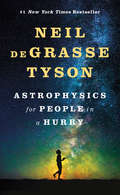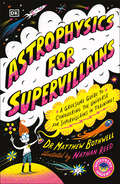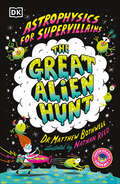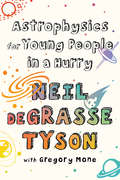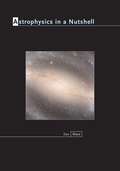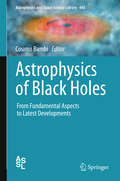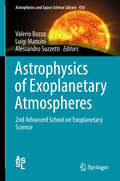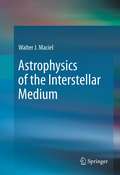- Table View
- List View
Astroparticle Physics: Theory and Phenomenology (Atlantis Studies in Astroparticle Physics and Cosmology #1)
by Günter SiglThis books aims at giving an overview over theoretical and phenomenological aspects of particle astrophysics and particle cosmology. To be of interest for both students and researchers in neighboring fields of physics, it keeps a balance between well established foundations that will not significantly change in the future and a more in-depth treatment of selected subfields in which significant new developments have been taking place recently. These include high energy particle astrophysics, such as cosmic high energy neutrinos, the interplay between detection techniques of dark matter in the laboratory and in high energy cosmic radiation, axion-like particles, and relics of the early Universe such as primordial magnetic fields and gravitational waves. It also contains exercises and thus will be suitable for both introductory and advanced courses in astroparticle physics.
Astrophotography
by Thierry LegaultToday's photographic equipment allows amateurs to take pictures of the stars that far surpass images taken just a few decades ago by even the largest observatories-and this book will teach you how.Author and world-renowned astrophotographer Thierry Legault teaches the art and techniques of astrophotography: from simple camera-on-tripod night-scene imaging of constellations, star trails, eclipses, artificial satellites, and polar auroras to more intensive astrophotography using specialized equipment for lunar, planetary, solar, and deep-sky imaging. Legault shares advice on equipment and guides you through techniques to capture and process your images to achieve spectacular results.Astrophotography provides the most thorough treatment of the topic available. This large-format, richly illustrated book is intended for all sky enthusiasts-newcomers and veterans alike.Learn how to:Select the most useful equipment: cameras, adapters, filters, focal reducers/extenders, field correctors, and guide telescopes Set up your camera (digital, video, or CCD) and your lens or telescope for optimal resultsPlan your observing sessionsMount the camera on your telescope and focus it for razor-sharp imagesPolar-align your equatorial mount and improve tracking for pin-point star imagesMake celestial time-lapse videosCalculate the shooting parameters: focal length and ratio, field of view, exposure time, etc.Combine multiples exposures to reveal faint galaxies, nebulae details, elusive planetary structures, and tiny lunar craters Adjust contrast, brightness, light curves, and colorsPostprocess your images to fix defects such as vignetting, dust shadows, hot pixels, uneven background, and noiseIdentify problems with your images and improve your results
Astrophotography for the Amateur
by Michael A. CovingtonFirst published in 1999, this much expanded and updated edition of the best-selling handbook Astrophotography for the Amateur provides a complete guide to taking pictures of stars, galaxies, the Moon, the Sun, comets, meteors and eclipses, using equipment and materials readily available to the hobbyist. In this new edition, the book has been completely revised and now includes new chapters on computer image processing and CCD imaging; expanded advice on choosing cameras and telescopes; completely updated information about the films; a much larger bibliography; and hundreds of new photographs (in colour, and black and white) demonstrating the latest equipment and techniques. Astrophotography for the Amateur has become the standard handbook for all amateur astronomers. This expanded and updated edition provides an ideal introduction for beginners and a complete handbook for advanced amateurs. It will also appeal to photography enthusiasts who can discover how to take spectacular images with only modest equipment.
Astrophotography is Easy!: Basics for Beginners (The Patrick Moore Practical Astronomy Series)
by Gregory I. RedfernThere are many books covering different facets of astrophotography, but few of them contain all the necessary steps for beginners in one accessible place. Astrophotography is Easy! fills that void, serving as a guide to anybody interested in the subject but starting totally from scratch. Assuming no prior experience, the author runs through the basics for how to take astrophotos using just a camera—including cell phones and tablets—as well as a telescope and more sophisticated equipment.The book includes proven techniques, checklists, safety guidelines, troubleshooting tips, and more. Each chapter builds upon the last, allowing readers to master basic techniques before moving on to more challenging material. Also included is a comprehensive list of additional books and resources on a variety of topics so readers can continue expanding their skills. Astrophotography Is Easy! doesn’t simply teach you the basic skills for becoming an astrophotographer: it provides you with the foundations you will need for a lifelong pursuit.
Astrophotography on the Go: Using Short Exposures with Light Mounts (The Patrick Moore Practical Astronomy Series)
by Joseph AshleyNo longer are heavy, sturdy, expensive mounts and tripods required to photograph deep space. With today's advances in technology, all that is required is an entry-DSLR and an entry level GoTo telescope. Here is all of the information needed to start photographing the night sky without buying expensive tracking mounts. By using multiple short exposures and combining them with mostly 'freeware' computer programs, the effect of image rotation can be minimized to a point where it is undetectable in normal astrophotography, even for a deep-sky object such as a galaxy or nebula. All the processes, techniques, and equipment needed to use inexpensive, lightweight altazimuth and equatorial mounts and very short exposures photography to image deep space objects are explained, step-by-step, in full detail, supported by clear, easy to understand graphics and photographs. Currently available lightweight mounts and tripods are identified and examined from an economic versus capability perspective to help users determine what camera, telescope, and mount is the best fit for them. A similar analysis is presented for entry-level telescopes and mounts sold as bundled packages by the telescope manufacturers. This book lifts the veil of mystery from the creation of deep space photographs and makes astrophotography affordable and accessible to most amateur astronomers.
Astrophysical Applications of Gravitational Lensing
by Evencio Mediavilla José A. Muñoz Francisco Garzón Terence J. MahoneyGravitational lenses offer the best, and sometimes the only, means of tackling key problems in many fields of astrophysics and cosmology. According to Einstein's theory, the curvature of light-rays increases with mass; gravitational lenses can be used to map the distribution of mass in a Universe in which virtually all matter is dark matter of an unknown nature. Gravitational lensing has significantly improved our knowledge of many astrophysical phenomena, such as exoplanets, galaxies, active galactic nuclei, quasars, clusters, large-scale structure and the Universe itself. All these topics are covered fully in this book, together with two tutorials on lens and microlensing modelling. The future of lensing in relation to large surveys and the anticipated discoveries of thousands more gravitational lenses is also discussed, making this volume an ideal guide for postgraduate students and practising researchers in the use of gravitational lenses as a tool in their investigations.
Astrophysical Black Holes (Lecture Notes in Physics #905)
by Ugo Moschella Vittorio Gorini Francesco Haardt Aldo Treves Monica ColpiBased on graduate school lectures in contemporary relativity and gravitational physics, this book gives a complete and unified picture of the present status of theoretical and observational properties of astrophysical black holes. The chapters are written by internationally recognized specialists. They cover general theoretical aspects of black hole astrophysics, the theory of accretion and ejection of gas and jets, stellar-sized black holes observed in the Milky Way, the formation and evolution of supermassive black holes in galactic centers and quasars as well as their influence on the dynamics in galactic nuclei. The final chapter addresses analytical relativity of black holes supporting theoretical understanding of the coalescence of black holes as well as being of great relevance in identifying gravitational wave signals. With its introductory chapters the book is aimed at advanced graduate and post-graduate students, but it will also be useful for specialists.
Astrophysical Techniques
by C.R. KitchinLong used in undergraduate and introductory graduate courses, Astrophysical Techniques, Seventh Edition provides an accessible yet comprehensive account of the innovate instruments, detectors, and techniques employed in astronomy and astrophysics. Emphasizing the underlying unity of all astronomical observations, this popular textbook provides a coherent state-of-the-art account of the instruments and techniques used in current astronomy and astrophysics. Fully updated throughout, this seventh edition builds upon the sixth edition, covering improved techniques and cutting-edge methods in the field, as well as other exciting new developments in gravitational waves, dark matter and energy, the use of photonics, and astronomy education and outreach, in addition to further detailed discussions on the latest scientific instruments and individual detectors. The book is written in a very accessible manner, and most of the mathematics is accessible to those who have attended a mathematics course in their final years at school. Nevertheless, the treatment of the topics in general is at a sufficiently high level to be of use to those professionals seeking technical information in areas of astronomy with which they might not be completely familiar. Key Features: Details the instrumentation and theory of astronomical observations, including radio waves, gamma rays, cosmic rays, neutrinos, gravitational waves and dark matter and energy and more Presents the background theory and operating practice of state-of-the-art detectors and instruments Fully updated to contain the latest technology and research developments
Astrophysics (Undergraduate Lecture Notes in Physics)
by Wolfgang DemtröderThis introduction to astronomy and astrophysics provides an accessible and clear treatment of the fundamentals. Starting with experimental astronomy, observation techniques and structure and properties of the components of the solar system, this textbook enables the reader to understand the basics in astrophysics. The text is written from the experimental physics point of view, giving numerous real life examples and detailed instrumentation and experimental methods. This highly motivating presentation deepens the knowledge in a very accessible way. The second part of the text gives a concise introduction to stars and extra-solar planets. The stellar evolution and categorization is explained. The last part features cosmological models, galaxy evolution and large scale objects in the universe. Numerous problems with solutions are perfect for self-study.
Astrophysics For Dummies
by Cynthia Phillips Shana PriwerDiscover the undiscovered with this jargon-free introduction to astrophysics Astronomy is the study of what you see in the sky. Physics is the study of how things work. Astrophysics is the study of how things in the sky work, from large objects to tiny particles. Astrophysics For Dummies breaks it all down for you, making this difficult but fascinating topic accessible to anyone. Tracking the topics covered in a typical undergraduate astrophysics class, this book will teach you the essential pieces to understanding our universe. Get ready to launch into outer space with this ever-changing branch of science. Discover the latest advances in the world of astrophysics Understand how and why galaxies form and evolve Find out the origins of cosmic rays Get a standalone primer on the science or supplement your astrophysics courseStudents in introductory astrophysics courses and would-be astronomy buffs who want to better understand the mechanics of the universe will love Astrophysics For Dummies.
Astrophysics Is Easy!: An Introduction for the Amateur Astronomer (The Patrick Moore Practical Astronomy Series)
by Michael InglisAstrophysics is often -with some justification - regarded as incomprehensible without the use of higher mathematics. Consequently, many amateur astronomers miss out on some of the most fascinating aspects of the subject. Astrophysics Is Easy! cuts through the difficult mathematics and explains the basics of astrophysics in accessible terms. Using nothing more than plain arithmetic and simple examples, the workings of the universe are outlined in a straightforward yet detailed and easy-to-grasp manner. The original edition of the book was written over eight years ago, and in that time, advances in observational astronomy have led to new and significant changes to the theories of astrophysics. The new theories will be reflected in both the new and expanded chapters. A unique aspect of this book is that, for each topic under discussion, an observing list is included so that observers can actually see for themselves the concepts presented -stars of the spectral sequence, nebulae, galaxies, even black holes. The observing list has been revised and brought up-to-date in the Second Edition.
Astrophysics Is Easy!: An Introduction for the Amateur Astronomer (The Patrick Moore Practical Astronomy Series)
by Michael InglisAstrophysics is often –with some justification – regarded as incomprehensible without the use of higher mathematics. Consequently, many amateur astronomers miss out on some of the most fascinating aspects of the subject. Astrophysics Is Easy! cuts through the difficult mathematics and explains the basics of astrophysics in accessible terms. Using nothing more than plain arithmetic and simple examples, the workings of the universe are outlined in a straightforward yet detailed and easy-to-grasp manner. Following on the success of the first and second editions, this fully updated third edition covers the significant changes in astrophysics theories and research that have occurred in the last five years, including new material on: exomoons, exocomets and exoasteroids; Special and General Relativity; gravitational waves, their origins and detection; telescope optics; black hole astrophysics; and more. For each topic under discussion, an observing list is included so that observers can actually see for themselves the concepts presented – stars of the spectral sequence, nebulae, galaxies, even black holes. The book also features in-text, nonmathematical questions and end-of-chapter problems – all with their accompanying solutions – to help readers discuss and digest the material.
Astrophysics Through Computation
by Brian Koberlein David MeiselThis new text surveys a series of fundamental problems in astrophysics, both analytically and computationally for advanced students in physics and astrophysics. The contents are supported by over 110 class-tested Mathematica notebooks, allowing rigorous solutions to be explored in a visually engaging way. Topics covered include many classical and historically interesting problems, enabling the students to appreciate the mathematical and scientific challenges that were overcome in the subject's development. The text also shows the advantages and disadvantages of using analytical and computational methods. It will serve students, professionals, and capable amateurs to master the quantitative details of modern astrophysics and the computational aspects of their research projects.
Astrophysics at Very High Energies: Saas-Fee Advanced Course 40. Swiss Society for Astrophysics and Astronomy (Saas-Fee Advanced Course #40)
by Charles Dermer Felix Aharonian Lars Bergström Marc Türler Roland WalterWith the success of Cherenkov Astronomy and more recently with the launch of NASA's Fermi mission, very-high-energy astrophysics has undergone a revolution in the last years. This book provides three comprehensive and up-to-date reviews of the recent advances in gamma-ray astrophysics and of multi-messenger astronomy. Felix Aharonian and Charles Dermer address our current knowledge on the sources of GeV and TeV photons, gleaned from the precise measurements made by the new instrumentation. Lars Bergström presents the challenges and prospects of astro-particle physics with a particular emphasis on the detection of dark matter candidates. The topics covered by the 40th Saas-Fee Course present the capabilities of current instrumentation and the physics at play in sources of very-high-energy radiation to students and researchers alike. This book will encourage and prepare readers for using space and ground-based gamma-ray observatories, as well as neutrino and other multi-messenger detectors.
Astrophysics for People in a Hurry
by Neil DeGrasse Tyson<P>The essential universe, from our most celebrated and beloved astrophysicist. <P>What is the nature of space and time? How do we fit within the universe? How does the universe fit within us? There’s no better guide through these mind-expanding questions than acclaimed astrophysicist and best-selling author Neil deGrasse Tyson. But today, few of us have time to contemplate the cosmos. So Tyson brings the universe down to Earth succinctly and clearly, with sparkling wit, in tasty chapters consumable anytime and anywhere in your busy day. <P>While you wait for your morning coffee to brew, for the bus, the train, or a plane to arrive, Astrophysics for People in a Hurry will reveal just what you need to be fluent and ready for the next cosmic headlines: from the Big Bang to black holes, from quarks to quantum mechanics, and from the search for planets to the search for life in the universe. <P><b>A New York Times Bestseller</b>
Astrophysics for People in a Hurry
by Neil deGrasse TysonOver a year on the New York Times bestseller list and more than a million copies sold. The essential universe, from our most celebrated and beloved astrophysicist. What is the nature of space and time? How do we fit within the universe? How does the universe fit within us? There’s no better guide through these mind-expanding questions than acclaimed astrophysicist and best-selling author Neil deGrasse Tyson. But today, few of us have time to contemplate the cosmos. So Tyson brings the universe down to Earth succinctly and clearly, with sparkling wit, in tasty chapters consumable anytime and anywhere in your busy day. While you wait for your morning coffee to brew, for the bus, the train, or a plane to arrive, Astrophysics for People in a Hurry will reveal just what you need to be fluent and ready for the next cosmic headlines: from the Big Bang to black holes, from quarks to quantum mechanics, and from the search for planets to the search for life in the universe.
Astrophysics for Physicists
by Arnab Rai ChoudhuriDesigned for teaching astrophysics to physics students at advanced undergraduate or beginning graduate level, this textbook also provides an overview of astrophysics for astrophysics graduate students, before they delve into more specialized volumes. Assuming background knowledge at the level of a physics major, the textbook develops astrophysics from the basics without requiring any previous study in astronomy or astrophysics. Physical concepts, mathematical derivations and observational data are combined in a balanced way to provide a unified treatment. Topics such as general relativity and plasma physics, which are not usually covered in physics courses but used extensively in astrophysics, are developed from first principles. While the emphasis is on developing the fundamentals thoroughly, recent important discoveries are highlighted at every stage.
Astrophysics for Supervillains (Supervillian Academy)
by Dr. Matthew BothwellBased on real questions from children, expert author Dr. Matt Bothwell has created a Supervillain Academy to teach astrophysics to middle graders."What happens if you throw someone into a black hole?""Could you crash the moon into the Earth?""If the sun explodes, would we all get vaporized?"Discover the answer to these questions and many more in this fascinatingly morbid school, Dr. Matt Bothwell teaches astrophysics to young bad guys-in-training. The facts about space are all well and good, but discovering that if you threw someone into a black hole, they would be spaghettified— stretched out long and thin before getting squashed smaller than an atom—is truly, fascinatingly gruesome. Using a framing device of a "supervillain academy," the readers start as new students on their first day at this school. The three overarching subjects—covering the solar system, galaxy, and universe—are different classes taught at the school. The "evil school" motif will allow for funny callout boxes and illustrations (a blackboard lesson showing "Top Ten Ways to Die in Space," for example).
Astrophysics for Supervillains 2 The Great Alien Hunt (Supervillian Academy)
by Dr. Matthew BothwellLearn all about space travel, alien planets and life beyond Earth in this fun and factual space book for kids.“How do you travel in style across the galaxy?”“What do aliens really look like?”“What is the Fermi paradox, and why should we care about it?”Discover the answers to these questions and many more at the Supervillain Academy: the magnificently morbid school for young villains in training. Read more about how the search for extraterrestrial life and the search for planets are linked, the exoplanets and extremophiles that can be found all over the galaxy, and the weird and wonderful ways scientists think we (might) be able to travel around space.A factual and full-of-fun astronomy book for young big thinkers and budding scientists!An accessible and enjoyable introduction to astrophysics, explaining big topics in a simple wayPacked with facts about the solar system, galaxies, and the universe, and, most importantly, the answer to the question: “Are we really alone?”Each chapter is linked to science topics that children study at schoolScientific concepts are brought to life with humorous illustrationsBased on real (and morbid) questions from children, expert astronomer and author Dr. Matt Bothwell has created this kids' science book to teach astrophysics to middle graders. Perfect for fans of Kay’s Marvellous Medicine and the Horrible Histories series, Astrophysics for Supervillains 2: The Great Alien Hunt is the second book of the Supervillain Academy series: a space-themed, fact-based exploration of space that will have curious kids keen to get to school on time!
Astrophysics for Young People in a Hurry
by Neil deGrasse TysonNeil deGrasse Tyson’s #1 New York Times best-selling guide to the cosmos, adapted for young readers. From the basics of physics to big questions about the nature of space and time, celebrated astrophysicist and science communicator Neil deGrasse Tyson breaks down the mysteries of the cosmos into bite-sized pieces. Astrophysics for Young People in a Hurry describes the fundamental rules and unknowns of our universe clearly—and with Tyson’s characteristic wit, there’s a lot of fun thrown in, too. This adaptation by Gregory Mone includes full-color photos, infographics, and extra explanations to make even the trickiest concepts accessible. Building on the wonder inspired by outer space, Astrophysics for Young People in a Hurry introduces an exciting field and the principles of scientific inquiry to young readers.
Astrophysics in a Nutshell
by Dan MaozA concise but thorough introduction to the observational data and theoretical concepts underlying modern astronomy, Astrophysics in a Nutshell is designed for advanced undergraduate science majors taking a one-semester course. This well-balanced and up-to-date textbook covers the essentials of modern astrophysics--from stars to cosmology--emphasizing the common, familiar physical principles that govern astronomical phenomena, and the interplay between theory and observation.In addition to traditional topics such as stellar remnants, galaxies, and the interstellar medium, Astrophysics in a Nutshell introduces subjects at the forefront of modern research, including black holes, dark matter, gravitational lensing, and dark energy, all updated with some of the latest observational results. To aid physical understanding, mathematical derivations are kept as simple, short, and clear as possible, and order-of-magnitude estimates, dimensional analysis, and scaling arguments are frequently used. These no-nonsense, "back-of-the-envelope" calculations train students to think like physicists. The book is amply illustrated with simple, clear figures and each chapter ends with a set of problems. In addition to serving as a course textbook, Astrophysics in a Nutshell is an ideal review for a qualifying exam and a handy reference for teachers and researchers.The most concise and up-to-date astrophysics textbook for science majors Contains a broad and well-balanced choice of traditional subjects and current research topics Uses simple, short, and clear derivations of physical results Trains students in the essential skills of order-of-magnitude analysis Includes teaching problems with each chapter
Astrophysics of Black Holes: From Fundamental Aspects to Latest Developments (Astrophysics and Space Science Library #440)
by Cosimo BambiThis book discusses the state of the art of the basic theoretical and observational topics related to black hole astrophysics. It covers all the main topics in this wide field, from the theory of accretion disks and formation mechanisms of jet and outflows, to their observed electromagnetic spectrum, and attempts to measure the spin of these objects. Black holes are one of the most fascinating predictions of general relativity and are currently a very hot topic in both physics and astrophysics. In the last five years there have been significant advances in our understanding of these systems, and in the next five years it should become possible to use them to test fundamental physics, in particular to predict the general relativity in the strong field regime. The book is both a reference work for researchers and a textbook for graduate students.
Astrophysics of Exoplanetary Atmospheres: 2nd Advanced School on Exoplanetary Science (Astrophysics and Space Science Library #450)
by Valerio Bozza Luigi Mancini Alessandro SozzettiIn this book, renowned scientists describe the complexity of exoplanetary atmospheres and all of the observational techniques that are employed to probe them. Readers will also find a panoramic description of the atmospheres of the planets within the Solar System, with explanation of considerations especially relevant to exoplanets. Over the past few years, thousands of exoplanets have been discovered orbiting around stars relatively close to the Solar System. Astronomers have revealed how varied these exoplanets are (rocky, icy, giant) and how diverse their architecture can be, confirming science fiction images in several cases and extending beyond the human imagination in others. The natural next step is to study their atmospheres and to understand their chemical composition and the physical processes taking place in their interiors, with the aim of detecting biomarkers. This book will appeal to all who seek a comprehensive, state-of-the-art account of the latest knowledge in the rapidly developing and highly interdisciplinary field of exoplanet research.
Astrophysics of Planet Formation
by Philip J. ArmitageConcise and self-contained, this textbook gives a graduate-level introduction to the physical processes that shape planetary systems, covering all stages of planet formation. Writing for readers with undergraduate backgrounds in physics, astronomy, and planetary science, Armitage begins with a description of the structure and evolution of protoplanetary disks, moves on to the formation of planetesimals, rocky, and giant planets, and concludes by describing the gravitational and gas dynamical evolution of planetary systems. He provides a self-contained account of the modern theory of planet formation and, for more advanced readers, carefully selected references to the research literature, noting areas where research is ongoing. The second edition has been thoroughly revised to include observational results from NASA's Kepler mission, ALMA observations and the JUNO mission to Jupiter, new theoretical ideas including pebble accretion, and an up-to-date understanding in areas such as disk evolution and planet migration.
Astrophysics of the Interstellar Medium
by Walter J. MacielThe space between the stars contains a large diversity of objects in which physical processes occur that are fundamental to the structure and evolution of galaxies. This book offers the reader a basic knowledge of these processes and presents simple numeric estimates of the main quantities relevant to the interstellar medium. The main objects that constitute the interstellar space are described, but the emphasis of the book lies in the physical processes occurring in these objects, which may also occur in other astrophysical environments. The book is directed tor graduate as well as advanced undergraduate students of physics and astrophysics.
